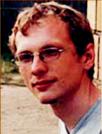
english-lapickaja-8kl-rus
.pdf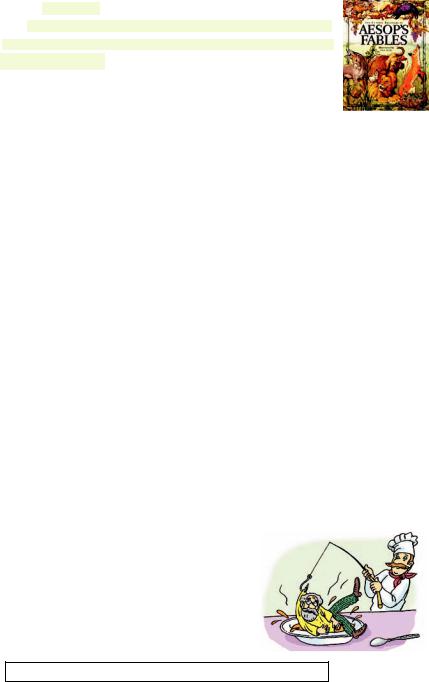
4. Here are not only the Tortoise and the Hare but a lot more amusing characters which have been entertaining and teaching people for thousands of years. The storyteller Aesop lived in ancient Greece, but his clever little stories are as instructional today as they were long ago.
|
|
а |
4. How can teenagers be encouraged to read more? Read the tips |
||
(советы) and explain why you agree or disagree with them. |
||
|
л |
|
To encourage reading: teachers should give students tasks |
||
о |
|
|
for reports, give them lists for summer reading, organise meet- |
||
к |
|
|
ings with authors, organise class and school book fairs (книжные ярмарки), open a bookpage in your class wall newspapers, recommend to watch films based on books, let students decide what’s interesting for them, not to tell them what to read.
5. Write your portrait “I am a reader”. Would you like to change so- |
|||
mething in your attitude to books and reading? |
|||
|
|
|
ш |
Are you an intellectual reader? A non-fiction reader? |
|||
|
|
я |
|
A newspaper reader? A glossy (глянцевый) magazine reader? |
|||
A fiction reader? |
|
а |
|
Lesson 3. Is poetryш enjoyable? |
|||
|
й |
|
|
1. Do you like poetry? Who is your favourite poet? Is poetry enjoya- |
|||
|
э |
|
|
ble? Why or why not? |
|
|
|
2a. Rhyme and rhythm are typical of poetry. Read the limericks and |
|
discover the structureш and the rhyming lines of limericks. Complete |
|
the sentences. |
|
|
ы |
There was an Old Man of the North, |
|
Who fell into a bowl of broth; |
|
В |
|
But a very good …
Fished him out with a hook,
Which saved that Old Man of the
North.
found lost her cook Ness York
161
Правообладатель "Вышэйшая школа"
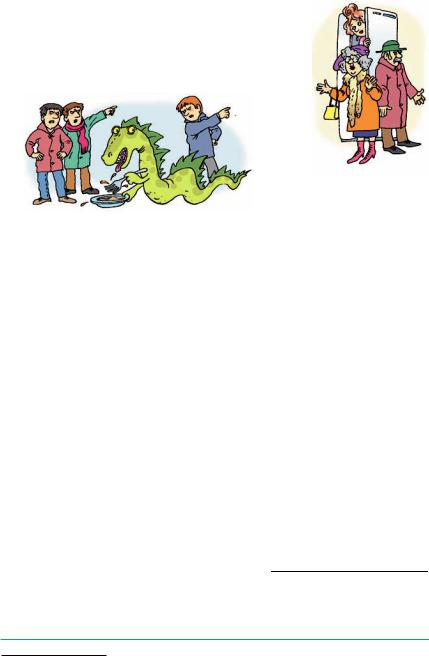
«
There once was a lady of Gloucester [ glÅst´] Whose parents thought they had ….
From the fridge came a sound And at last she was …
But the problem was how to defrost1 her.
|
|
|
|
|
|
а |
|
|
|
|
|
л |
|
|
|
|
|
о |
|
|
There was a young monster in … |
к |
|
|
|||
|
|
ш |
|
|
|
|
Which liked to eat soup with a fork. |
|
|
|
|||
People cried, “What a mess! |
|
|
|
|
|
|
You must go to Loch …! |
я |
|
|
|
|
|
We use forks to eat pork here in York.” |
|
|
||||
|
|
|
|
|
|
|
а |
York |
|
|
|
||
found lost her cook Ness |
|
|
|
|||
ш |
|
|
|
|
|
« |
2b. Complete the Factfile about a limerick. |
|
|
|
|
||
Factfile. A limerick is a piece of … poetry which consists of … The rhyming lines are …
A limerick goes back to the 18th-century Ireland [ aI´l´nd]. It |
||
|
ш |
by Edward Lear [lI´] in the 19th cen- |
was popularized in Englishй |
||
tury, although heэdid not use the term. |
||
ы |
|
|
Grammar focus: Relative pronouns
В1. There was an Old Man of the North. 2. He fell into a bowl of broth. = There was an Old Man of the North who fell into a bowl of broth. 

Who, whose, whom – for people. Also: I don’t like books whose characters are aggressive.
Which – for objects and ideas.
1 defrost – разморозить
162
Правообладатель "Вышэйшая школа"
3a. Remember the poems you have read in this book. How can you characterize them?
Help box. The poem which is called …. is full of … humour / |
|||||
love and romance / excitement / amusement / fun / horror / |
|||||
mysteries / discoveries / adventures / action / events / sen- |
|||||
timent / aggression / fights / deaths / life / optimism / en- |
|||||
thusiasm / pessimism. |
|
|
|
|
а |
|
|
|
|
|
|
The author who wrote about … draws the picture of / loves / |
|||||
|
|
|
|
л |
|
enjoys / describes / encourages interest in / is happy that … / |
|||||
is sad that … |
|
|
|
|
|
|
|
|
о |
|
|
3b. Remember any poem you have read and tell your classmates |
|||||
about it. |
|
ш |
|
|
|
|
|
|
|
|
|
3c. Can poetry be enjoyable? Which statements do you agree with? |
|||||
Decide with your class. |
я |
|
к |
|
|
♦ Rhyme and rhythm make poetry sound like music. ♦ Po- |
|||||
|
а |
|
|
|
|
etry is beautiful because poets choose the best words. ♦ Prose is
better than poetry because it includes a wide range of genres.
|
|
|
ш |
4. Speak about your likes or dislikes in books. |
|||
|
|
й |
|
Help box. I prefer / don’t mind books which are full of … |
|||
|
э |
|
|
I also like / don’t like books whose characters are … |
|||
humorous / mysterious / adventurous / aggressive / horrible |
|||
|
ш |
|
|
funny / enjoyable |
|
|
|
romantic / optimistic / pessimistic / enthusiastic / fantas- |
|||
ы |
|
|
|
tic / realistic |
|
|
|
actionless / eventless / lifeless |
|||
В |
|
|
|
amusing / touching / moving / boring / interesting / de- |
|||
pressing / exciting / fascinating |
|||
Such books make me feel amused / touched … |
|||
|
|
|
|
5. Read about Belarusian literature and fill in who, whose, whom, which.
Belarusian literature is full of great authors who occupy a high position in the world. It covers a lot of genres, … are found
163
Правообладатель "Вышэйшая школа"

in the world literature. First of all, we should remember the names of our outstanding national writers Yanka Kupala and Yakub Kolas, … created new Belarusian literature and … names are at the top of the list of Belarusian writers.
Children and teenagers will be attracted by adventure and science fiction stories by Yanka Maur, … were written quite a
long time ago, but … have not lost their attractiveness for the
reader. Do you remember his “Palesse Robinsons”1 or “In the
Bykov’s stories and novels, … we know as theлauthorаof war prose, are simply unforgettable. And the fables,«… were created by K. Krapiva, are as clever as those by Aesop [ i:s´p]. This list
country of the Paradise Bird”2? We enjoy the poems … were
written by Adam Mitskevich and Maxim Bogdanovich. Vasil
1b. Is it necessary to study classical literature at school? Do you enjoy reading it? Who is your favourite author?
is really long: Alexei Dudarev, Ivan Melezh … |
||||||
|
|
|
|
|
|
о |
6. Write about the Belarusian authors you know.кUse who, whose, |
||||||
whom, which. |
|
|
|
|
||
|
||||||
Help box. 1. … is the author, … is famous for his book … 2. It |
||||||
|
|
|
|
|
ш |
|
is a story, … tells us about … 3. The main character, … name |
||||||
is …, lives in the country / city / town / place which is …. |
||||||
|
|
|
|
я |
|
|
4. He / she has got a friend / family … 5. One day he / she … |
||||||
|
|
|
а |
|
|
|
6. It happens so that … 7. In the end the main character … |
||||||
which is great / sad / lucky / happy. |
|
|||||
|
|
|
йш |
|
|
|
|
|
|
|
|
|
|
Lesson 4. They have stood the test of |
||||||
time |
|
|
э |
|
|
|
1a. Read the titleшof the lesson and guess what you are going to read |
||||||
and speak about. |
|
|
|
|
||
В |
ы |
|
|
|
|
|
|
|
|
|
|
|
|
2a. Who wrote these books? Look through the texts and decide which author you would like to read about.
1 «Палескія Рабінзоны» (1929); 2 «У краіне райскай птушкі»
(1926)
164
Правообладатель "Вышэйшая школа"
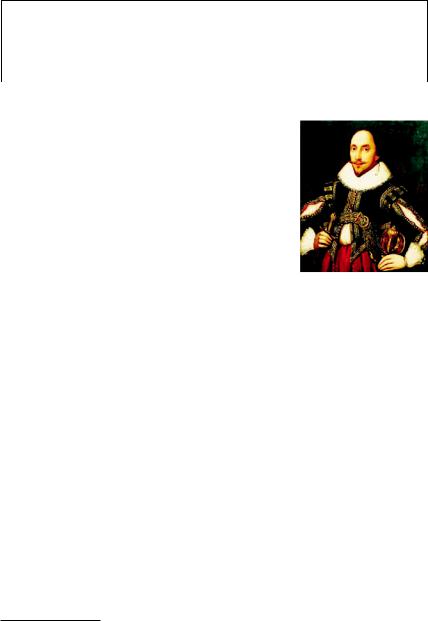
2b. Choose a text (A–D) to read about the writer. Make notes to tell your classmates about him / her:
Help box. when he / she was born; where he / she lived; his / her family and education; when and where he / she started writing; his / her famous books; what impressed (впечатлило) you about the author.
|
|
|
|
|
|
|
|
|
а |
playwright – an author who writes plays |
|
|
|||||||
|
л |
||||||||
|
|
|
|
|
|
|
|
||
A. Nearly 450 years after his death |
|
|
|||||||
|
о |
|
|||||||
William Shakespeare, a famous play- |
|
|
|||||||
|
|
|
|
||||||
wright, continues to be the greatest writer |
к |
|
|
||||||
in the English language. He was born in |
|
|
|||||||
|
|
|
|
||||||
Stratford-upon-Avon in 1564. His father |
|
|
|
|
|||||
|
|
|
|
|
ш |
|
|
|
|
sold gloves and became an important per- |
|
|
|
|
|||||
son in the town. William, one of eight chil- |
|
|
|
|
|||||
|
|
|
я |
|
|
|
|
|
|
dren, was the eldest son, and educated at |
|
|
|
|
|||||
the local grammar school. He |
|
married |
|
|
|
|
|||
|
|
а |
|
|
|
|
|
|
|
when he was only 18 and |
his wife, Anne Hathaway |
||||||||
« « |
|
ш |
|
|
|
|
|
|
|
[ Qn hQT´weI], was eight years older than him. They had two |
|||||||||
girls and a boy who died at the age of 11. |
|
|
|
|
|||||
|
й |
|
|
|
|
|
|
|
|
Nobody knows how Shakespeare began to write, or when he |
|||||||||
entered the theatre. But we know that he left his family and |
|
э |
« |
moved to London shortly after his marriage [ mQrIdZ] to start acting career. By 1592 he became a leading playwright. He worked in the theatre troupe which was so popular, that King James I gave it the right to perform at his court [kç:t], and it became known as ‘The King’s Men’.
about Nothing”, and many others. His plays made it the most important theatre company in the country. He also wrote poems and sonnets.
Shakespeare wrote 37 plays, including “Hamlet”, “King |
||
|
|
ш |
Lear”, “Othello”, “Romeo and Juliet”, “Macbeth”, “Much Ado |
||
В |
ы |
|
In 1610 he returned to his native town of Stratford-upon- Avon. His life was much quieter there. He was very successful and rich in his time. He had a big house and owned1 a lot of land
1 owned [´Und] владел
165
Правообладатель "Вышэйшая школа"
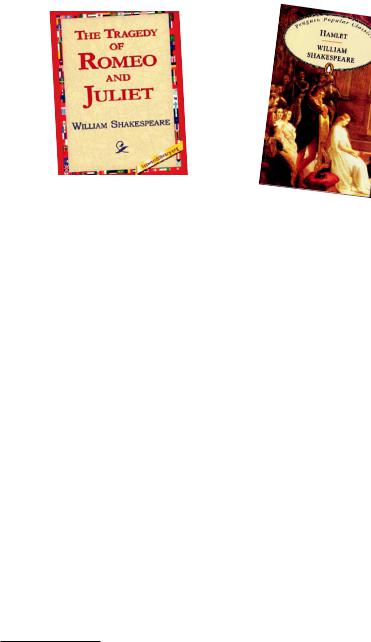
|
|
|
а |
|
|
л |
|
« |
о |
|
|
к |
|
|
|
and he part-owned two theatres in London, where his plays were regularly performed.
However this historical figure is still surrounded by mystery. Some critics doubt1 whether he wrote the plays at all. They argue that for a literary genius [ dZi:ni´s] his education and life
experiences were very limited (ограничены) – he was not a |
|||
widely travelled author. |
а |
ш |
|
But a recently published book by James Shapiro proves that |
|||
the plays are Shakespeare’s own,яthough many of his later plays |
|||
were co-written. |
|
|
|
|
|
|
co = together with |
The fact is that Shakespeare’s plays are still popular today |
|||
and performed in lots ofшtheatres round the world. |
|||
|
« |
« |
|
B. Arthur ConanйDoyle [«A:T´ kon´n dçIl] was born on 22 May |
|||
1859 in Edinburgh,эScotland, to a father of Irish origin, Charles |
|||
ы |
|
|
|
Altamont Doyle, and an Irish mother, Mary Foley. |
|||
Conan Doyle was sent to the Roman Catholic Jesuit school, |
|||
Stonyhurst, atшthe age of nine and then continued at Stonyhurst |
|||
College. |
|
|
|
From 1876 to 1881, he studied medicine at the University of |
|||
Edinburgh. In 1885 he became a doctor of medicine2. |
|||
ВSeveral times from 1891 to 1892 Conan Doyle tried to open a |
|||
medical practice, first |
|
« |
|
in Plymouth [ plIm´T], then in |
|||
« |
|
|
|
Portsmouth [ pç:tsm´T] and finally in London. Business was
1 doubt [daUt] сомневаются; 2 a doctor of medicine – ученая степень «доктор медицинских наук»
166
Правообладатель "Вышэйшая школа"
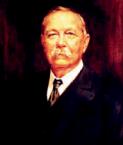
never very successful and he had a lot of |
|
|
free time to discover a range of other tal- |
|
|
ents and interests. He joined football, bowl- |
|
|
ing, political, literary and cricket clubs and |
|
|
began writing stories again. His first story |
|
|
appeared in Edinburgh before he was |
|
|
twenty. |
а |
|
He was married twice – in 1885 and |
||
|
||
then in 1907 after his first wife’s death, |
|
and had five children in these two marriages.
His first notable literary creation, called “A Study in Scar-
let”, appeared in 1887. It introduced Sherlock Holmes and his |
|
« |
л |
friend Dr. Watson [ wÅts´n] for the first time. |
|
In 1892, the first out of five collections of Sherlock Holmes |
|
|
о |
stories was published. In 1893, the year of his father’s death, |
|
Doyle decided to kill Sherlock Holmes andкdid so in December
rather than his detective. But the governmentш and public wanted to see Sherlock Holmes back to life, so a story about
that year. He wanted to be remembered for his historical novels
Sherlock Holmes’s secret mission for the government during a |
|
|
я |
time of war appeared in 1903. 1917 was the last year a Sherlock |
|
Holmes story was published. |
а |
|
|
By 1920, Sir Arthur Conan Doyle had become one of the |
|
highest paid writers in theшworld. But after the death of his son Kingsley, his brother Innes and other close relatives shortly
after World War I and his mother’s death in 1921 Doyle was in |
|
|
й |
э |
|
ш |
|
deep depression. He found comfort in spiritualism, which tried
to find proof of life after death. On 7 July 1930, Sir Arthur |
|
Conan Doyle died from heart disease. |
« |
|
|
As an author, he wrote plays, verse, memoirs [ memwA:z], |
|
shortВstories,ыhistorical novels (“The Lost World”), and supernatural fiction. But he will be mostly remembered as the creator
of one of the greatest literary detectives ever to live.
« «
C. Joanne Rowling [dZ´U Qn r´UliN], author of the best-sell- ing Harry Potter series of books, was born on 31 July, the same day as her famous boy-wizard hero. The family, including her parents and younger sister Di, lived near Bristol, in southwest England. Her father worked on airplane engines for Rolls Royce.
167
Правообладатель "Вышэйшая школа"
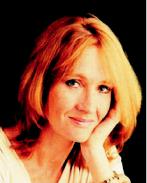
Joanne – called Jo by her family and |
||
friends – did well at school, and was the |
||
top girl in her class. Her favourite sub- |
||
jects were English and foreign lan- |
||
guages. After finishing public school |
||
with top honours1 in English, French, |
||
and German, Rowling went on to study |
||
|
|
а |
French at the University of Exeter |
||
« |
|
|
[ eksIt´]. She graduated from the uni- |
||
versity in 1986 and over the next few |
||
|
о |
|
years worked as a secretary in different |
||
firms. |
к |
|
What she really wanted to do, however, was toлwrite. Rowl- |
||
ing wrote her first story, “Rabbit”, at the age of five or six. Later, she tried her hand at writing novels, but she had never finished writing any novel before she wrote the Harry Potter books. It was during the difficult time when she came back to Britain with a baby daughter after her unsuccessful marriage
in Portugal. |
ш |
Following its publication in Britain in June 1997, “Harry |
|
children and adults alike and won numerous awards2. The Harry
Potter and the Philosopher’s Stone” quickly became a hit with |
|
|
я |
а |
|
ш |
|
Potter series includes seven books – one book for every year that
Harry spends at Hogwarts. In 2000, the 35-year-old author be-
came the highest-earning woman in« Britain. She received an
OBE (Order of the British Empire [ empaI´]), a medal awarded |
|||
|
|
ш |
|
by the queen, in Marchй2001. At the end of that same year, she |
|||
married her secondэhusband, and in 2003 and 2005 gave birth |
|||
|
ы |
|
|
to a boy and a girl. |
|
||
In 2008 she was named the 12th richest person in Britain. |
|||
В |
|
|
« |
Rowling’s books have been translated into more than 60 languages, and more than 300 million copies have been sold around the world. The first four books have been made into films, and all four are among the top twenty highest-grossing films of all time. In February 2004, Forbes magazine named her as the first person ever to become a billionaire[«bIlj´ ne´] from writing books.
1 |
|
« |
2 |
« |
with top honours [ ç:n´z] с отличием; |
awards [´ wç:dz] |
|||
награды
168
Правообладатель "Вышэйшая школа"
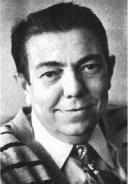
D. Vladimir Korotkevich (November |
|
|
|
|
26, 1930 – July 25, 1984) is an ex- |
|
|
|
|
tremely talented Belarusian author who |
|
|
|
|
was born in 1930 in Orsha, Vitebsk re- |
|
|
|
|
gion. In 1954 he graduated from the |
|
|
|
|
Philological Department of Kiev Univer- |
|
|
|
|
sity and taught first in a village school in |
|
|
|
|
the Kiev region of Ukraine and then in |
|
л |
||
his home town, Orsha. Later, he com- |
|
|||
|
|
а |
||
pleted a literature (1960) and then cine- |
о |
|||
matography (1962) course in Moscow. |
||||
к |
|
|||
Literature became his main occupation. His first published work was a poem which appeared in 1951, and was later followed by three collections of verse. V. Korotkevich also wrote a number of novels, including “The Dark Castle Olshansky” and “The Wild Hunt of King Stakh” (“Дзікае паляванне караля Стаха”, 1964), as well as plays, essays, articles, screenplays for films,
and some very interesting detective and adventure stories. He is |
|
|
ш |
a winner of several national literary awards. |
|
This is how a lot of people couldяdescribe their first experi- |
|
ence of reading Korotkevich: |
|
а |
|
“I was 15 or 16 years old. I unfolded the book by Vladimir |
|
Korotkevich with the firstшpart of “The Ears of Rye under Thy Sickle” («Каласы пад сярпом тваiм»). It was absolutely fasci-
nating! When I openedйthe book it was difficult to close it. I lost
track of time and cameэback to reality only when I had finished the book. I was always looking forward to reading books by V.
Korotkevich. It’sшlike today’s children look forward to reading another Harry Potter book.”
Korotkevich has a lot to offer. His literary works are full of
romanticism, rich imagination and emotions. They encourage |
|
|
ы |
love and respect to our motherland. |
|
В |
|
2c. In groups of four exchange the information about the authors. Have you read any books by these authors?
3. Write 10 – 15 sentences about your favourite author.
169
Правообладатель "Вышэйшая школа"
